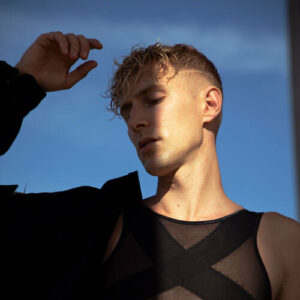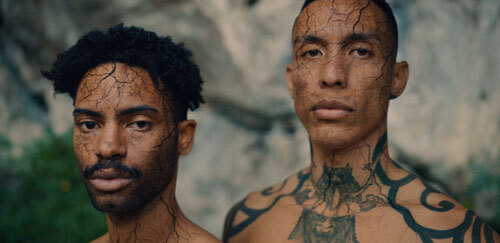Rob Woodcox: Candid Interview on Art, Queer Love, Mental Health, and ‘Honey to the Moon’
Rob Woodcox is a fine art photographer and film director, with nearly 250,000 followers on Instagram.
Rob’s passion for photography has developed into a dedication to advocacy; he has developed projects to raise consciousness and conversation around the US foster system, adoption, queer identity, body neutrality, racial equality and environmental justice. Having been adopted as a child and interacting often with the foster care system, Rob creates from a unique perspective, finding hope in human connection and the will to overcome negative constructs within our complex societies.
Rob has taught thousands of students in 6 continents, 15 countries and over 35 cities worldwide. He has been featured in various major publications and exhibitions, and has produced commercial work for clients like Apple, Universal Pictures and Capitol Records.
Rob has collaborated with HeadsUpGuys multiple times, sharing his art and reach to help to raise awareness of men’s mental health.
Q&A
An interview by Josh Beharry, HeadsUpGuys Project Manager, about Rob’s film, the process of creating it, and the meanings behind it.
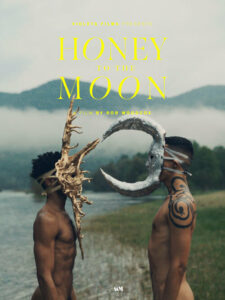 What is Honey to the Moon?
What is Honey to the Moon?
Honey to the Moon is my first short film. Set in Mexico and shot in a stunning tropical landscape, it’s a surreal piece that extends the imaginative style I’m known for onto the big screen. The story intersects queer love with dazzling visual effects and focuses on mental health as a foundation for life.
A collaborative effort between myself, local Mexican governments, a crypto backer who has produced NFTs of the work, and the talented queer artists who participated in every capacity.
Honey was recently selected for and premiered at the Oscar qualifying Provincetown International Film Festival in June of this year. We’ve also screened to over 1,500 filmgoers thus far in Mexico City, London, and Minneapolis. We have been invited to numerous other film festivals and expect, in total, to reach at least 60-80 markets globally on the festival circuit.
Honey to the Moon is now available to view on Nowness (8:40) – Mature Content (non-sexual or non-explicit nudity).
Where did the idea for the film come from and how did you turn that idea into the final product?
This film was conceptualized right after I went through a breakup and was experiencing some very deep alone time. It was Christmas of 2021, still covid vibes, and I was alone in Mexico City. I wrote about my experiences of love and started visualizing all these surreal scenes as I documented each stage of love, like chapters of a book.
That next spring I met some producers who pushed me to focus more on cinema – I had previously spent 15 years in still photography but wanted to experiment with this larger medium. I spoke to some private collectors of mine and one of them expressed interest in funding the film – he believed in my directorial and conceptual abilities and suddenly in the summer of 2022 we were scouting locations with a fully funded film.
We spent a year between that first scout and the release this past summer (2023), producing this beautiful work of art. Filming on location is such an incredible experience, I loved seeing 50 people come together to make these scenes perfect. The endurance of the actors, the ingenuity of the art department, and the dedication of the whole production team paired with our cinematographer’s stunning eye made this film really stand out.
What differed when creating a film like this versus a photography series (what did this medium allow you to better represent or show)?
Creating films is like entering a whole new world of expression – it’s similar to photography but just a much longer commitment. It’s like planning 100 photoshoots (scene by scene) and then asking the whole set to move instead of stand still. I really enjoy the challenge and I think my unique focus on compositions for the last 15 years leaves me pre-dispositioned to create beautiful cinematic scenes as well.
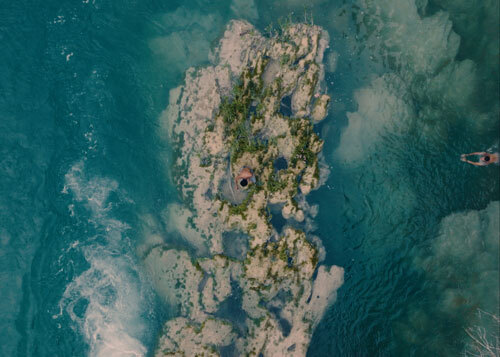
What does “honey” represent visually in the film and also its inclusion in the title (i.e. it’s not called Sun and the Moon)?
The honey in this film represents pure passion, enjoyment and lust. The sun shares a similar golden, liquid quality with honey so when we were exploring potential titles we discovered Honey to the Moon as a poetic representation of the Sun and Moon instead of making it so literal.
Why did you choose to explore these concepts through a more natural outdoor setting, rather than a similar theme in an urban setting?
I’ve always connected deeply with nature and feel that if I had the choice, I’d live more immersed in non-urban environments. Nature also feels more surreal and whimsical to me, and I wanted that to be represented in the feeling of love.
Love makes me float into the clouds, to an alternate universe. Originally we were going to start the film in a restaurant and have the actors “float” into nature as the alternate reality, but we decided to just keep the whole experience in its own world.
What does the separation of the two characters by others represent? (or possible interpretations?)
The night scene where both characters get torn apart represents so much for me. It’s definitely the heaviest moment in the film and when you see it in a theatre the sound really rumbles you to the core!
For me it represents people and ideas that can come between two lovers to ruin a relationship. Whether it be cheating, jealousy, new interests, different directions in each person’s life, disapproving family – the list goes on – I think when both people don’t have a healthy foundation of self-love, it’s easier for them to give in to outside forces.
The film ends on what I interpreted as a sad note, with the two main characters separated from each other. Why did you choose to end the story like this?
The ending could be seen as sad, or as a fresh start. I suppose that’s in the eye of the beholder. I don’t like to explain the ending because I want people to take away what’s important for them in any given moment they might be viewing the film.
What is the main message or theme you want viewers to take away?
Near the end of the film, the protagonist, named “Moon”, can be seen cleansing himself in nature of all the toxins he’d experienced through romance. Though love can be beautiful, it’s not sustainable when we don’t first love and take care of ourselves.
I really want to send a message of self love and acceptance with this film. In a society that pushes us all to live for the dreams of the wealthy and powerful and to burn ourselves out in the pursuit of “capitalistic success”, I want people to remember their power to choose a different, more sustainable and fulfilling path.
How has being queer affected your mental health, from being a young adult to now? (I know this is a big question!)
Queerness is a beautiful thing to experience, but it definitely made some of my adolescence challenging. I was raised in a very conservative environment that didn’t try to understand anything outside that bubble.
I was oblivious to it when I was really young, but there was a lot of buried internal angst in my teen years and early twenties. Luckily, I came across an incredible artistic community that included lots of queer individuals and ended up discovering that life can feel very open and free when you’re surrounded by people that truly love and support you. That’s the ultimate goal.
What were some key moments of self-acceptance/building self confidence related to above?
At one point I was working at my parent’s church and had taken a beautiful portrait of a queer couple during a photo meetup. I posted it on social media and someone from the church reported me to my boss saying this went against the by-laws of the church. I was asked to take it down, but felt personally targeted and didn’t want to let my friends down so I changed the caption to a Bible verse about loving everyone regardless of their background, and my boss couldn’t say anything against that.
I think standing up for myself then was a huge moment, and a week later I quit my job and officially came out to my best friend.
What do you think are some of the most important things a queer person, who is unsure of their sexuality (or the reaction they will get from their community), can do towards improving their mental health?
Three things I did when I was uncertain of my sexuality, but wanted to feel grounded were the following:
I would spend as much time around other people who were already out and open, or vocal allies of the LGBTQ community; being in a safe space is so important. I would research stories of people who felt the same way I felt, so I could feel connected and validated despite some of the hostile surroundings I was in.
Something I’ve always done to generally improve my mental health, regardless of the scenario, is spend time in nature alone or with a close loved one. Nature always heals and makes me feel connected – it removes all the human constructs and allows me to breathe and think clearly away from the hustle of cities.
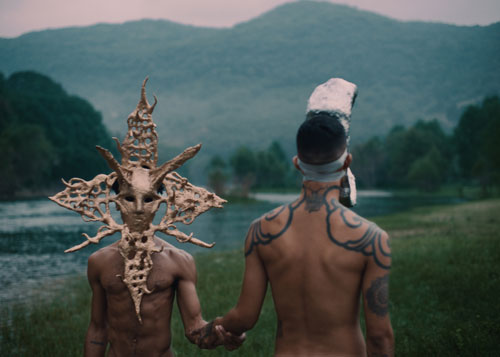 How has creating work related to queerness helped your mental health and confidence? Is the process of creating work like Honey to the Moon, self-healing?
How has creating work related to queerness helped your mental health and confidence? Is the process of creating work like Honey to the Moon, self-healing?
Art has always been a therapeutic process to me. I think it’s known in psychological practices that talking about our experiences helps us release inner tension. With that in mind, art is like a full body release, it allows me to physically create while also mentally and spiritually releasing.
Honey to the Moon chronicles my experiences falling in and out of love through surreal symbolism and dance performance. It was very cathartic working with my romantic partner Eduardo (the lead actor and movement director) to help tell my story and release those experiences. Getting to see how people feel and connect with the film is one of the best experiences ever – I love that the human connection extends through the screen to help other people release as well.
Last question! What’s on your horizon for future projects?
I’m currently breaking ground on research for my first feature film, which will blend art and documentary to celebrate frontline climate change communities that are actively solving the crisis.
I’m so excited to show a more hopeful side to the conversation and be another bridge in connecting people who can impact these topics positively. We’re doing research in Colombia, Mexico, Bahamas, Tahiti, Canada, Kenya and the United States with the aim to film in at least 5 countries. Anyone interested in learning more or participating in this project can contact me via my website’s contact page.
Thank you for your candid responses, Rob. Your answers have provided invaluable insight into your process and perspective, allowing myself and readers to connect with you and your art on a deeper level.
HeadsUpGuys and I greatly appreciate your ongoing support, and wish you the best in your ongoing creative journeys and life!

